Google unwraps a new Lollipop -- Android 5.1
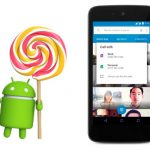
Many people may still be waiting for Android 5.0 Lollipop to make its way to their smartphone, but today Google released Android 5.1. This may have been a day dominated by the Apple Watch and new MacBook, but by launching an updated version of Lollipop on the same day, Google managed to avoid too much attention.
Was this done on purpose because of the small number of handsets that will be in line to receive Android 5.1? Or could it be because there are few stand out features to get excited about? There may be little new, but the performance and stability improvements will be welcomed by those eligible for the upgrade.
Google proves once again it is terrible at selling smartphones

Getting the latest Nexus smartphone from Google in the first few months of availability can prove to be a real adventure. You know how it goes, as the same thing has happened before with its predecessor. You have to be either extremely lucky to get one early on or extremely committed to the brand to put up with the perennially insufficient stock by waiting your turn at finally getting one. It's insane.
Because of these issues, I have long given up on the thought of buying the latest Nexus smartphone while it's hot -- including the Nexus 6 phablet, as much as I would love to grab one. The fault lies consistently with Google. The search giant is terrible at selling smartphones. Even worse, it comes up with a crappy excuse to justify it.
I sold my MacBook Pro and bought a Chromebook

Yesterday afternoon, a San Diego State University student bought my MacBook Pro—13-inch Retina Display, 8GB RAM, 512GB SSD—for $1,100. I purchased the laptop from local dealer DC Computers in late-August 2014 for a few hundred dollars more. The buyer's interest was my own: Mac, large SSD, and extended warranty (expires April 2017).
The proceeds go to buying Toshiba Chromebook 2 (two, another for my wife) and Android phone for her. She moves from iPad Air, which has been, since September 2014, her PC—and that experience should be another story (be patient). If time travel was possible, I would keep, rather than sell, my Chromebook Pixel early last summer. The Chromie lifestyle suits me best, and I am excited to be back to it. However, in December, when reviewing the tech products that changed my digital lifestyle last year, including the switch to Apple's platforms: "I can’t imagine using anything else". I lied to myself, and unintentionally to you.
Motorola returns to China in full swing, with rebranded Nexus 6 in tow
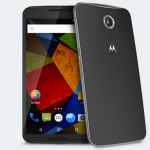
With Lenovo holding the reins, it is no surprise that Motorola has announced its return to China, the biggest smartphone market worldwide. The venerable maker will start selling its best-known smartphones in the country starting early this year.
Consumers in China will be able to get their hands on the second-generation Moto X and Moto G -- the latter with 4G LTE connectivity -- as well as Moto X Pro. For someone who knows Motorola's lineup, Moto X Pro looks like a new smartphone. However, it is a rebranded Nexus 6.
Android 5.0 Lollipop encryption severely impacts performance

Encrypting your device may make it more secure, but it also makes it slower due to the added overhead. This is not much of a problem on a fast PC or laptop, as its hardware is able to cope with the extra load. It, however, is a major reason for concern on Android 5.0 Lollipop devices, such as Google's new Nexus 6. Android 5.0 Lollipop is at fault here.
Anandtech has discovered that the difference in performance can be as high as 80.7 percent, and as low as 50.5 percent, between Nexus 6 with encryption turned on and with the feature disabled. Meanwhile, those who update to Android 5.0 Lollipop on Nexus 5 will also notice a notable difference in performance, albeit not as big, even with encryption disabled.
Nexus 6: vanilla Android never tasted so good [Review]
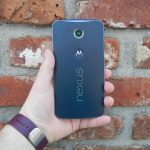
One of Android's most attractive aspects is also its greatest weakness. You see, unlike the iPhone and iOS, Google's Linux-based operating system is available to any manufacturer that is interested. This means you can see many Android devices in different shapes, sizes and styles. Hell, hardware aside, even the operating system can be customized. The problem is, with so much different hardware and tweaked software, many phones do not get regular updates -- this is also due to extensive carrier testing. To the average consumer, this is not a huge headache, as app compatibility is generally fine across versions. Where this becomes an issue is when vulnerabilities are discovered -- delays in updates or a total lack of updates can put a user at risk.
Enter the Nexus line of Android devices. Every year, Google hand-selects a manufacturer to build a smartphone running "vanilla" Android, meaning it is pure and not tweaked or customized. These phones (and tablets) are designed to get fast updates directly from Google. This ensures that not only does the user have the latest features, but the safest and newest version of the operating system too. The latest such phone is the Motorola-built Nexus 6 -- named as such for having a 6-inch screen (technically 5.96 inch). Is it the best Nexus yet?
Nexus 6 and Note 4 compared on video! Which one should you buy?
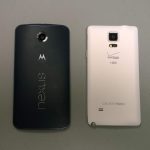
In the world of Android, there is rarely a clear-cut "best" smartphone. This is a good thing, as it signifies variety in the Android marketplace. In other words, consumers do not all have the same tastes; some like a smaller screen, some a larger screen and some even like having a stylus. However, with that said, even though people have different preferences, it is easy to identify the top flagship phones.
BetaNews has the two top Android smartphones in our lab. Yes, we have both the Samsung Galaxy Note 4 and Google's Motorola-manufactured Nexus 6. For the immediate future, these will be the phones of many consumers' desires. Deciding which of these two smartphones to buy is very problematic, but hey -- it's a great problem to have, right? Please read on, to see how the phones differ and which one you should buy.
Nexus 6 pre-orders sell out instantly -- Don't cry, there is still hope

If you are a fan of Android, there is something you may live and breathe for -- Nexus. True, fans may choose other devices for various reasons, but Nexus devices are the best way to get timely updates and a pure Android experience. As many of us have learned the hard way, non-Nexus devices may get stranded without updates and get left behind. Regardless of who is to blame, whether it is the manufacturers or the carriers, it can be an unpleasant experience to say the least.
The Nexus 6 is the newest Google handset, this time built by Motorola. Pre-ordering went live today, but something rather tragic happened -- it sold out. Yes, in merely a minute or so, the world raced to pre-order the smartphone and it is now out of stock from the Google Play Store. If you did not get to order one, you have my sympathies; it understandably sucks. However, all is not lost, you can still score one on launch day.
I will be putting the Nexus 6 in my front pocket -- should I worry about bending?

Of course, I ask this semi-facetiously, as I do not expect the Nexus 6 to bend at all. Heck, I keep all my smartphones in my front pocket, and have yet to experience any bending or damage. Sure, smartphones are getting larger, often testing the limits of pocket size; however, manufacturers should know a consumer's expectation about front pocket usage, and should take that into account in design.
Lately, I have been storing the large phone de jour, the Galaxy Note 4, in the front pocket of both my jeans and khakis. Guess what? It remains flawless -- no bending. So why am I asking this question? The iPhone 6 and 6 Plus of course! The "Bendgate" scandal has been criticized by many, for various reasons. I have seen people say "of course aluminum bends", and my favorite, "you should not put it in your front pocket". Really? That is just silly, as again, Apple knows that consumers keep smartphones in their front pockets, and the company has never warned against the practice.
How to switch from iOS to Android, according to Google
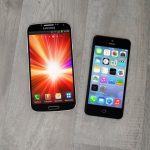
With Android 5.0 Lollipop, Nexus 6 and Nexus 9 on the horizon, as well as some great Android devices already on the market, some of you may be thinking about ditching iOS for Android. It is unquestionably a big decision, so you may want to ensure that the switch from an iPhone or iPad will be as painless as possible.
To help with the switch, Google has prepared a nifty guide that explains how you can migrate your data from iOS to Android, tackling key areas such as multimedia content, contacts, email, messaging and, of course, apps. You may recall that Apple posted a similar guide last month, detailing to would-be customers the steps they need to take to move from Android handsets to iPhones. Google now looks to simply be returning the favor.
Phablet showdown: Google Nexus 6 vs Samsung Galaxy Note 4
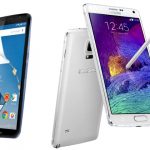
Google has just launched a shiny new addition to its signature Nexus range, the Nexus 6. At a whopping 5.96-inch, this is a beast of a phone that is bang on the phablet trend sweeping the global smartphone market. But how does it square up to the other large-screened powerhouses scrapping for your attention?
We pit its specs against those of the Samsung Galaxy Note 4 to see who (on paper) comes out on top.
Phablet showdown: Google Nexus 6 vs Apple iPhone 6 Plus
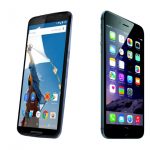
Google (with a lot of help from Motorola) has released the much-anticipated Nexus 6, updating its beloved Nexus 5 with an all-new look and beefed-up specs. But how does the Nexus 6 compare to other smartphones on the market?
More specifically, how does it fare against Apple's iPhone 6 Plus? Let's break down the specs and take a look.
Google and Asus launch Nexus Player for video, music and game-playing
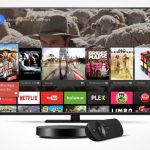
Well... Android Lollipop (née Android 5.0), the Nexus 6 and Nexus 9 were expected, but Google managed to sneak a little 'one more thing' addition to today's batch of announcements. Nexus Player, as you'd probably guess from the name (and certainly from the headline), is a streaming media device. But in addition to catering for all your video and music streaming needs, the device also doubles up as a games console.
In many ways the Nexus Player is an extension of Chromecast -- there is even casting support. Google has teamed up with Asus to bring us a device that not only streams media, but also streams games from phones and tablets. And this aims to be more than a console for casual gamers; there's even a gamepad that's very reminiscent of the Xbox One controller.
Google takes the wraps off Nexus 6, Nexus 9 [Update]
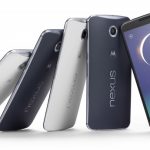
It is estimated that one in three smartphones shipped in 2018 will be a phablet, which is more than double their projected share for 2014. For Google -- with Android still likely to run on the majority of phablets -- helping developers to properly optimize their apps for larger screens has become a top priority. Ensuring that Android phablets provide a great user experience is paramount; otherwise, users may jump ship to Apple's iPhones or Microsoft's Windows Phones.
So, today, Google takes the wraps off its first phablet, Nexus 6. It is the embodiment of all the great features we have come to expect out of a phablet from late-2014: super high-resolution screen, super fast processor, solid cameras, very thin bezels and a huge battery. As expected, Google also announced a new tablet, the first one to come since July 2013, called Nexus 9. It does not disappoint either. Of course, both run the new Android 5.0 Lollipop, which is shipping in the next few weeks.
Recent Headlines
Most Commented Stories
BetaNews, your source for breaking tech news, reviews, and in-depth reporting since 1998.
Regional iGaming Content
© 1998-2025 BetaNews, Inc. All Rights Reserved. About Us - Privacy Policy - Cookie Policy - Sitemap.